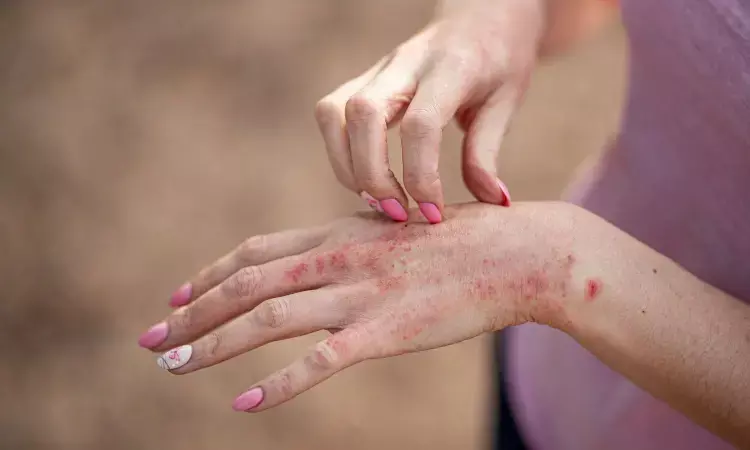- Home
- Medical news & Guidelines
- Anesthesiology
- Cardiology and CTVS
- Critical Care
- Dentistry
- Dermatology
- Diabetes and Endocrinology
- ENT
- Gastroenterology
- Medicine
- Nephrology
- Neurology
- Obstretics-Gynaecology
- Oncology
- Ophthalmology
- Orthopaedics
- Pediatrics-Neonatology
- Psychiatry
- Pulmonology
- Radiology
- Surgery
- Urology
- Laboratory Medicine
- Diet
- Nursing
- Paramedical
- Physiotherapy
- Health news
- Fact Check
- Bone Health Fact Check
- Brain Health Fact Check
- Cancer Related Fact Check
- Child Care Fact Check
- Dental and oral health fact check
- Diabetes and metabolic health fact check
- Diet and Nutrition Fact Check
- Eye and ENT Care Fact Check
- Fitness fact check
- Gut health fact check
- Heart health fact check
- Kidney health fact check
- Medical education fact check
- Men's health fact check
- Respiratory fact check
- Skin and hair care fact check
- Vaccine and Immunization fact check
- Women's health fact check
- AYUSH
- State News
- Andaman and Nicobar Islands
- Andhra Pradesh
- Arunachal Pradesh
- Assam
- Bihar
- Chandigarh
- Chattisgarh
- Dadra and Nagar Haveli
- Daman and Diu
- Delhi
- Goa
- Gujarat
- Haryana
- Himachal Pradesh
- Jammu & Kashmir
- Jharkhand
- Karnataka
- Kerala
- Ladakh
- Lakshadweep
- Madhya Pradesh
- Maharashtra
- Manipur
- Meghalaya
- Mizoram
- Nagaland
- Odisha
- Puducherry
- Punjab
- Rajasthan
- Sikkim
- Tamil Nadu
- Telangana
- Tripura
- Uttar Pradesh
- Uttrakhand
- West Bengal
- Medical Education
- Industry
Dupilumab therapy reduced atopic dermatitis symptoms in pediatric population, finds study

A new study published in the Journal of American Academy of Dermatology found that Dupilumab improved atopic dermatitis (AD) symptoms as well as quality of life (QoL) in pediatric patients and caregivers/families.
The effects of moderate-to-severe atopic dermatitis on kids and caregivers are significant. Assessing several symptoms (such as pruritus and sleep disruption) is challenging for professionals. In addition to clinician-reported outcomes, patient-reported outcomes (PROs) offer valuable support. When young patients cannot offer meaningful, trustworthy self-reports on their experiences, the US Food and Drug Administration and the International Society for Pharmacoeconomics and Outcomes Research Task Force recommend the use of observer-reported outcomes. Thus, this study by Amy Paller and colleagues was to assess how dupilumab medication affected young children's quality of life and symptoms of AD as reported by patients and caregivers.
Children with moderate-to-severe AD who were 6 months to 5 years old were enrolled in the randomized, placebo-controlled LIBERTY AD PRESCHOOL trial. They were given low-potency topical corticosteroids along with either dupilumab or a placebo for 16 weeks. The change in caregiver-reported outcomes of AD symptoms (such as itching and sleep) and QoL of patients as well as their caregivers/families was evaluated in this post-hoc study between baseline and week 16.
The participants who received dupilumab showed substantial improvements in caregiver-reported AD symptoms and quality of life when compared to the ones who received a placebo. When compared to the placebo group, the dupilumab group showed a least square mean (LSM) drop of -3.6 from baseline on the Worst Scratch/Itch Numerical Rating Scale (WSI-NRS) in week 1 and maintained it through week 16.
Also, 48% of the dupilumab group satisfied the criterion for a clinically relevant change in WSI-MRS, against 9% in the placebo group. The dupilumab group improved their sleep quality numerical rating scale (NRS) by 2.0 points from baseline to week 16 when compared to a 0.3 point change in the placebo group for both individuals and caregivers. The number of patients declaring no days or 1-2 days of itching in the previous 7 days differed more in the dupilumab group from baseline than in the placebo group.
Similarly, the proportion of patients stating no days and 1-2 days of sleep disturbances in the previous 7 days differed more between week 16 and baseline. Overall, Dupilumab helped individuals with AD symptoms and their families/caregivers' quality of life.
Source:
Paller, A. S., Silverberg, J. I., Simpson, E. L., Cork, M. J., Arkwright, P. D., Chen, Z., Bansal, A., Prescilla, R., Wang, Z., & Marco, A. R. (2024). The effect of dupilumab on caregiver- and patient-reported outcomes in young children with moderate-to-severe atopic dermatitis: results from a placebo-controlled, phase 3 study. In Journal of the American Academy of Dermatology. Elsevier BV. https://doi.org/10.1016/j.jaad.2024.09.039
Neuroscience Masters graduate
Jacinthlyn Sylvia, a Neuroscience Master's graduate from Chennai has worked extensively in deciphering the neurobiology of cognition and motor control in aging. She also has spread-out exposure to Neurosurgery from her Bachelor’s. She is currently involved in active Neuro-Oncology research. She is an upcoming neuroscientist with a fiery passion for writing. Her news cover at Medical Dialogues feature recent discoveries and updates from the healthcare and biomedical research fields. She can be reached at editorial@medicaldialogues.in
Dr Kamal Kant Kohli-MBBS, DTCD- a chest specialist with more than 30 years of practice and a flair for writing clinical articles, Dr Kamal Kant Kohli joined Medical Dialogues as a Chief Editor of Medical News. Besides writing articles, as an editor, he proofreads and verifies all the medical content published on Medical Dialogues including those coming from journals, studies,medical conferences,guidelines etc. Email: drkohli@medicaldialogues.in. Contact no. 011-43720751


